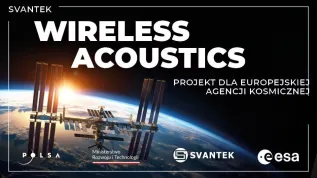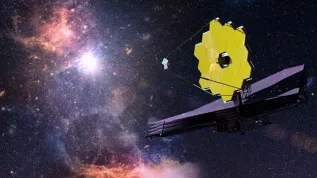
A Polish astronaut is to fly into space next year, Piotr Zabadała, deputy Director of Department of Innovation and Industrial Policy at the Ministry of Development and Technology and delegate of the Polish Space Agency, said during the Space Sector Forum in Warsaw.
Sławosz Uznański, an ESA project astronaut, was chosen in 2023 to take part in the mission after beating off competition from over 20,000 other candidates.
He will be only the second ever Pole to go into space.
'Last year, the Ministry of Development and Technology signed four bilateral agreements with ESA; I hope that these will not be the only such agreements. The first of them - a scientific and technological mission with the participation of a Polish astronaut, very important from the point of view of developing opportunities for industry and scientific units - will be implemented next year. A package of experiments is currently being prepared. We have divided them into three working goals: technological experiments that will test technologies developed by Polish companies, scientific experiments and educational experiments (they will be implemented before, during and after the mission that will take place next year)', Zabadała said.
He added that increasing the Polish contribution to the ESA budget by EUR 295 million in 2023 (the total is now EUR 360 million) was a big challenge, saying: ‘We are preparing to spend increased funds from the European Space Agency (ESA) budget. This is a big challenge for administration, industry and science’.
Zabadała listed the most important investments accompanying the Polish astronaut's mission. One of them is support for the construction of the Polish Earth Observation constellation (including optical and radar observation satellites). 'ESA will announce the tender in June', Zabadała announced.
Another investment is the National Training Programme. It includes training and internships at ESA for Polish university graduates. 'The first dozen or so people started internships at ESA in April. The next recruitment processes will be organised in the fall', Zabadała said.
ESA BIC is an important programme financed from an increased contribution to the ESA budget. It assumes the promotion of entrepreneurship and the use of space technologies in various sectors of the economy as part of the incubation program. This measure also involves supporting cooperation between science, business and administration.
Another programme is the ESA Security Hub. The leader of the project is the Space Research Center of the Polish Academy of Sciences, which cooperates with local governments. 'The project assumes the creation of two hubs in Poland. But we are already cooperating with Space Research Center and ESA to expand it to other regional centres, not only in Poland. This is a very important crisis management project', Zabadała said.
The last programme he mentioned was 'Φ–Lab' (phi-Lab) in Poland. 'This programme is an attempt to fill the gap between the scientific and commercial parts. It will focus on the development of specific projects. It provides access to the research network and ESA, as well as the research networks of other partners in Europe', Zabadała said.
He also mentioned that the most important task from the point of view of the Ministry of Development and Technology would be preparation for the ESA Ministerial Council Meeting in autumn 2025. 'We will then assess the spending of funds. In the meantime, the Polish Space Agency will work on updating the Polish Space Strategy and preparing the National Space Programme. These two documents will specify the priorities in the development of the space sector in Poland and form the basis for planning expenses', Zabadała said.
The Space Sector Forum started this week in Warsaw. It is attended by representatives of the Ministry of Development and Technology responsible for cooperation with the European Space Agency (ESA) and coordination of the space mission of the Polish astronaut.
(PAP)
PAP - Science in Poland, Urszula Kaczorowska
uka/ bar/ kap/
tr. RL













